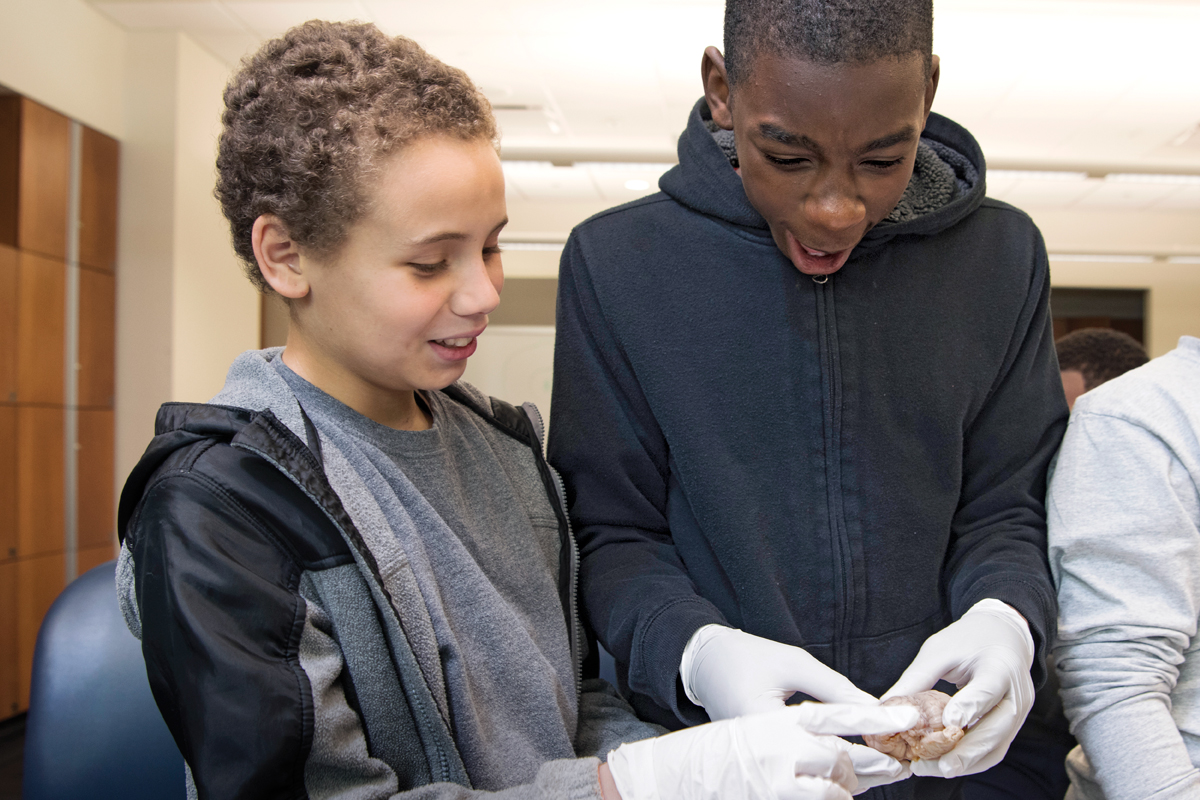
As part of a Young Scientist Program field trip to the Medical Campus, middle schoolers held animal brains.
The decibel and excitement levels were considerably higher than usual as students huddled over preserved human hearts during biology class at Vashon High School in St. Louis. A visiting Teaching Team — made up of graduate and medical students from Washington University’s Young Scientist Program (YSP) — led the hands-on demonstration.
Vashon biology teacher Samantha Lurie stepped back as the YSP team took charge, explaining how to measure blood pressure, use a stethoscope and identify parts of the heart. The team also showed the hearts of a smoker and nonsmoker, and discussed the related health risks.
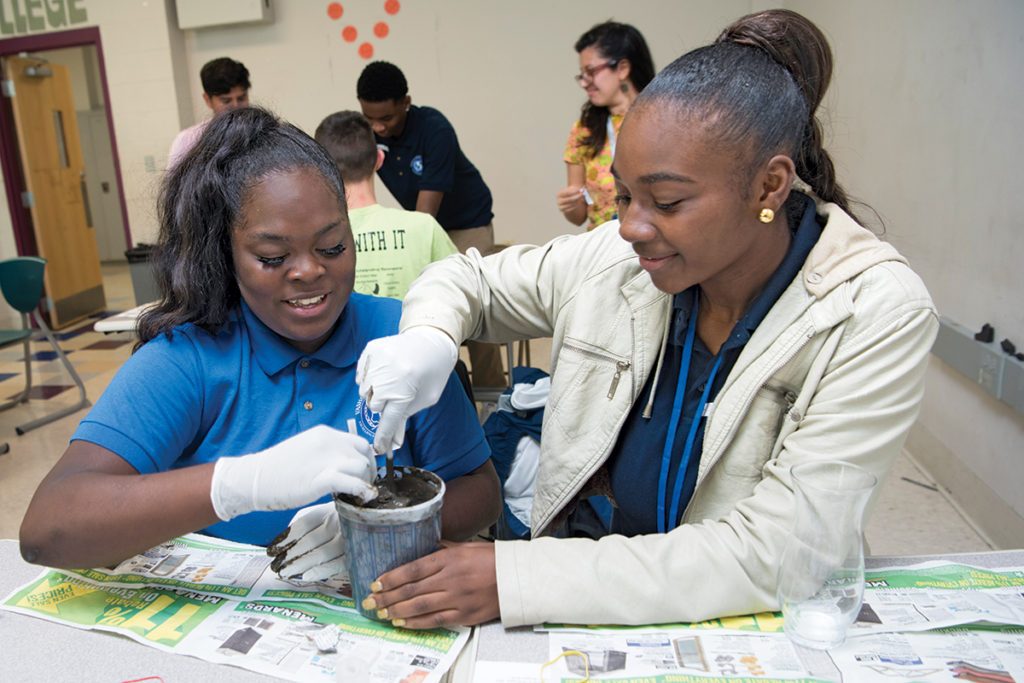
Teaching Teams from the Young Scientist Program (YSP) lead hands-on demonstrations in area classrooms. Vashon High School students build a Winogradsky column — a soil layer cake — during a presentation on ecology and evolution.
“The Teaching Team sparked the students’ curiosity,” she said. “It was great to see my students asking a lot of questions, and then later bragging about the experience to others.”
Participation is the cornerstone of the YSP. For 25 years, the YSP has increased the participation of underrepresented groups in science by bringing resources directly to St. Louis-area public schools.
“When I first came to the School of Medicine, there wasn’t much going on in terms of science education outreach to the surrounding community,” said James McCarter, MD, PhD, who co-founded the YSP in 1991 during medical school. McCarter now is head of research at Virta Health and an adjunct professor of genetics at the medical school.
“I was struck by the differing demographics between the urban communities we were serving and the people who were doing the research on campus,” he said. “I wanted to open the doors of opportunity to a broader group of people.”
To kick things off, an inaugural class of two high school students completed on-campus summer internships through the YSP. Now known as “Summer Focus,” it is a unique program that annually brings up to 16 outstanding high school students into university research labs for eight-week intensive biomedical internships, and provides a stipend. To honor the YSP’s 25th anniversary, McCarter, his wife Rosalie Truong, MD, PhD, and his parents, John and Judith McCarter, made a $100,000 gift commitment to the Summer Focus Program.
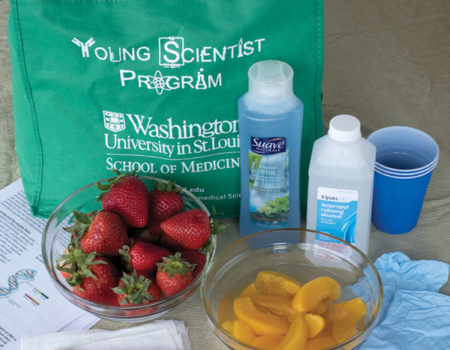
The YSP creates “experiments-in-a-bag” available online to K-12 schools.
The YSP since has expanded significantly beyond its flagship summer initiative. Teaching Teams regularly ignite the interests of K-12 students in subjects ranging from robotics to forensics to genetics. And YSP Teaching Kits (experiments-in-a-bag that include instructions and materials) help enable any adult, regardless of background, to lead inquiry-based science experiments with students. Kit topics cover nine subjects — such as DNA extraction and natural selection — to enhance a school’s science curriculum, and can be requested through the YSP’s website, ysp.wustl.edu.
Additionally, the YSP hosts field trips to the Medical Campus and presents “Family Medical School,” a series of annual public workshops at the Saint Louis Science Center. There, children and their parents learn about human anatomy and physiology, as well as diseases and ways to stay healthy. Through these and other efforts, the YSP has connected with more than 10,000 students.
Students leading students
Throughout its growth and evolution, YSP has remained a volunteer-led effort. Graduate and medical students coordinate the program, solicit funding, and generously share their time and talents to cultivate greater diversity in the next generation of scientists.
“The Young Scientist Program played a big part in my decision to attend Washington University,” said Reyka Jayasinghe, YSP co-director and a doctoral candidate in molecular genetics and genomics. “Many schools have great research and great faculty. But Washington University was the only school I could find with an opportunity for graduate students to mentor and work directly with students of all ages.”
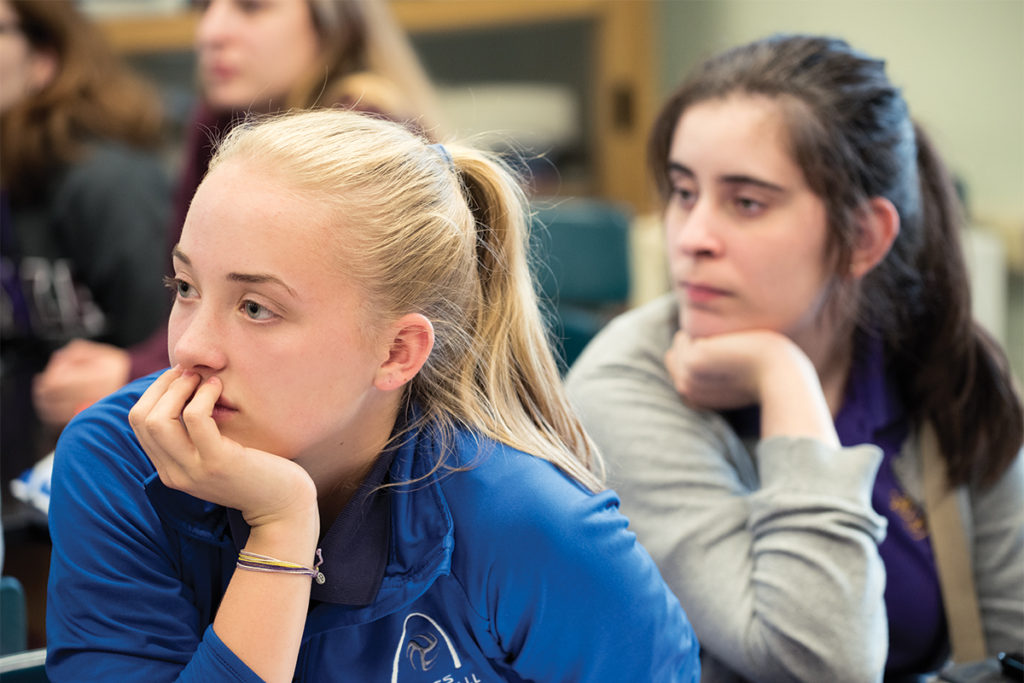
In its 25 years of existence, the YSP has connected with more than 10,000 students, encouraging many to consider STEM (science, technology, engineering, math) careers.
Volunteerism both distinguishes and enriches YSP tremendously. “First, the motivation of our leadership is entirely mission-driven, as opposed to a financial or professional obligation,” McCarter said. “Second, it allows for change. The Washington University students come into a leadership role for a year or two and move on. The program continually reinvents itself. Over the past 25 years, I have seen the program improve and iterate with each new generation of student leadership.”
Boahemaa Adu-Oppong, a YSP co-director and doctoral candidate in evolution, ecology and population biology, helped launch the newest outreach effort: Continuing Mentoring.
Continuing Mentoring provides a steady source of mentorship for science-interested students from Soldan International Studies High School and the Collegiate School of Medicine and Bioscience, a public magnet school.
“There was no curriculum when we started,” Adu-Oppong said. “We had to build it from scratch.”
In the program, mentoring PhD or MD students meet twice monthly with the local students during all four years of high school and facilitate job shadowing opportunities with STEM (science, technology, engineering and math) professionals. Mentors also assist with ACT preparation, résumé making and the college application process.
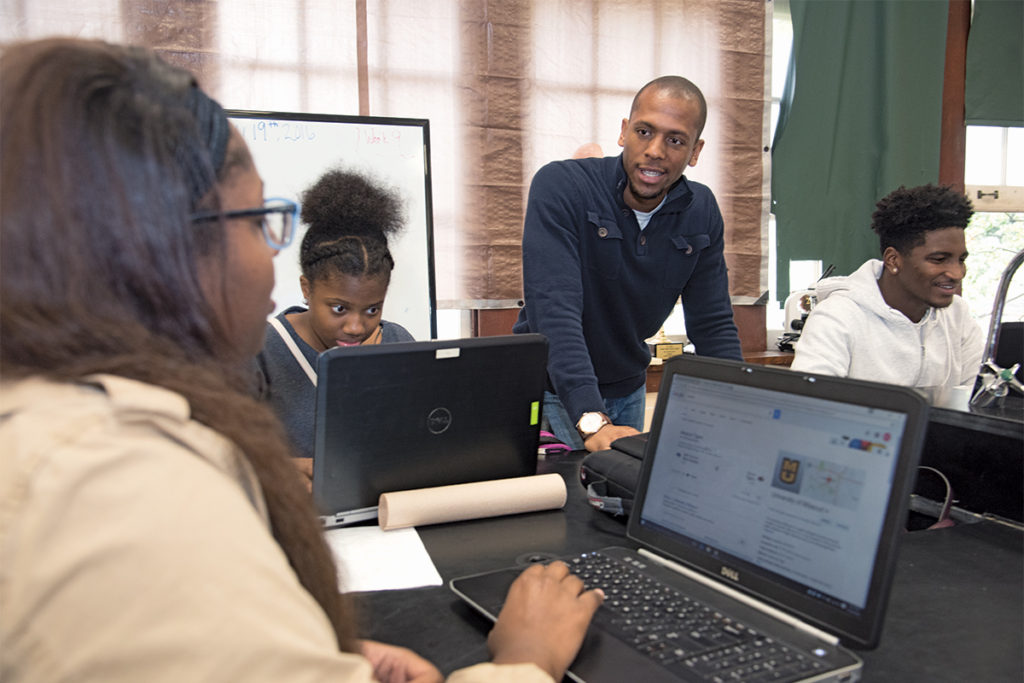
Mentor Jeffrey Gamble (center), a doctoral candidate in biomedical engineering, interacts with students at Soldan International Studies High School. YSP Continuing Mentor volunteers meet regularly with students during all four years of high school.
For Jeffrey Gamble, a doctoral candidate in biomedical engineering, volunteering as a Continuing Mentor for students at Soldan was an easy decision. “As a young black man from this area, I thought it was important for the students to see someone striving to do his best in a field that traditionally has few black people participating,” he said.
Gamble said some of his best mentoring memories are the unscripted ones, when he simply shared his own struggles with students. “I was having problems with my PhD research,” he explained. “I was able to show them that things are going to be hard, but you can push through it.”
The first cohort that participated for all four years graduated this past May. Out of the dozen Soldan graduates, half are now pursuing STEM fields in college.
Thinking in new ways
An overarching message runs through all of the YSP’s efforts: Consider science in the broadest context. “There are a lot of ways you can pursue a scientific career,” said Elizabeth Danka, PhD, who volunteered with YSP in several roles during her doctoral studies in molecular cell biology. Danka is now a postdoctoral scholar at the University of North Carolina at Chapel Hill.
“If a student is smart, people tell them, ‘You should be a doctor.’ Well, maybe. But not everyone is good at interacting with people at their sickest and unhappiest.
“We help students think about the many ways — biomedical sciences, engineering, physics, and so forth — they can use their
brain and incorporate their scientific interests and make an impact,” she said.
Two years ago, Danka was paired as a Summer Focus mentor with India Bradley, a Cardinal Ritter College Prep High School student, who was interested in science but hadn’t chosen a specific focus. “I just knew I wanted to gain hands-on experience that summer,” Bradley said. She and her 15 fellow Summer Focus interns spent 40 hours a week, for eight weeks, on the Washington University campus. As part of the internship, Bradley worked alongside Danka, researching E. coli strains that cause urinary tract infections.
“Elizabeth was a wonderful role model,” Bradley said. “She broke everything down for me in a way I could understand.” Before long, Bradley was working independently at the lab bench, preparing protein gels and observing mice infected with E. coli strains. “It became my favorite part of my work, to see how the bacteria affected the mice and made them act,” she said.
The program also taught Bradley to read scientific literature and write about her work. Summer Focus participants present their research at a concluding forum, which is proudly attended by family members. “It’s exciting when people from the community see their children succeed in a world-class environment,” said John Russell, PhD, the YSP’s faculty adviser and associate dean for graduate education at the School of Medicine.
Bradley earned her first academic publishing credential when her Summer Focus research paper was accepted to the Journal for Emerging Investigators.
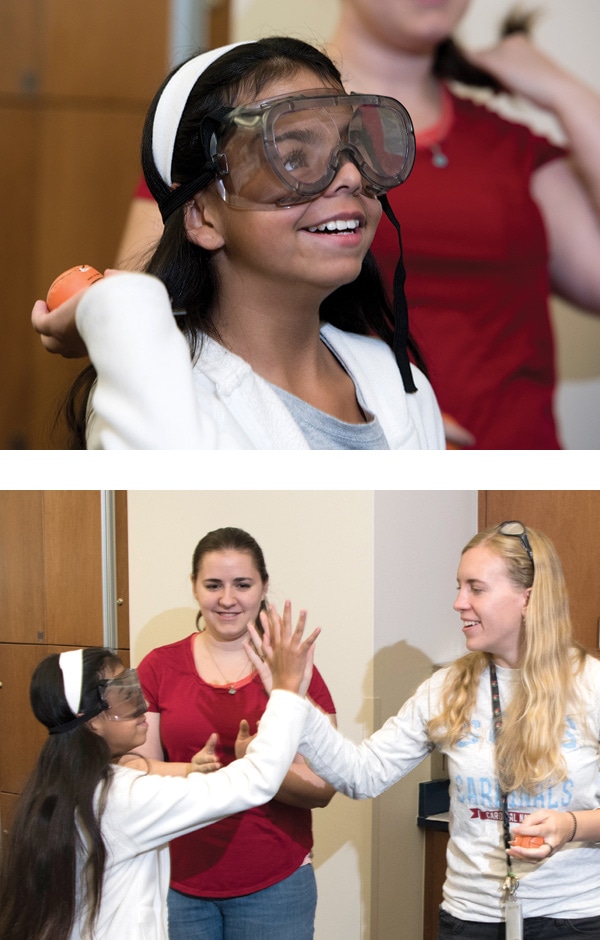
Wearing prism goggles and throwing balls at a target, students learned about visual-motor adaptation. At first, the students missed the target by as much as 10 feet. As their brains adapted to the distorted vision, the students began hitting the mark.
“Now that I’m in college, I realize how much YSP has helped and prepared me,” said Bradley, who is now a sophomore majoring in biology and pre-medicine at Howard University on a full-tuition scholarship. “My professors were impressed that I was already published and have told me that this makes me more competitive for medical school.
“The Summer Focus writing course put me ahead of my class, in terms of scientific writing. When I started working in the lab at Howard, I already knew the equipment and procedures.”
Later, she was invited to a national conference to present her freshman research on bacterial phages. “It was a breeze,” she said, “because of my Summer Focus experience.”
The legacy continues
Bradley is hardly alone among the 300-plus Summer Focus alumni in carrying YSP’s lessons with them into their academic and professional careers. In 1995, Bart Bartlett had none other than YSP founder Jim McCarter as his Summer Focus mentor. Two decades later, Bartlett, PhD, an associate professor of chemistry at the University of Michigan, still draws on his formative experiences.
“Even though Summer Focus started out with me doing some simple lab work, Jim made certain I could see the connection between what I was doing and the goals of what the lab was doing,” Bartlett explained.
“Now that I have undergraduates working in my lab, I try to emulate that mentorship by providing young people the opportunity to do something with their own hands in the lab, to contribute intellectually and to develop those connections,” he said. “What started at Summer Focus continues on.”
Published in the Winter 2016-17 issue


